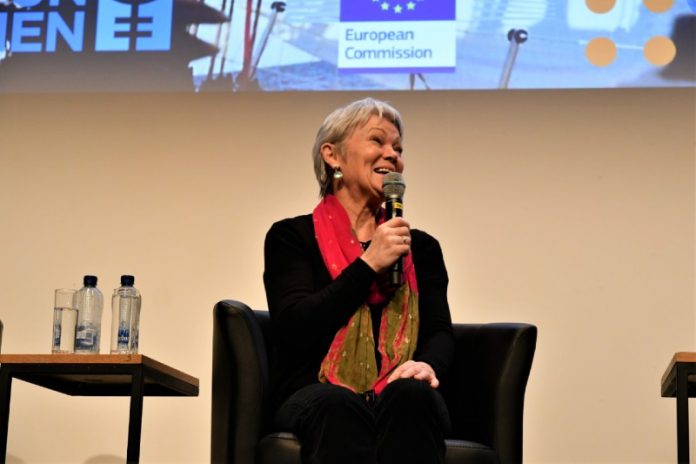On 9th March 2020, to mark International Women’s Day, Ciné-ONU partnered with the British Embassy, the European Commission, UN Women and UNFPA to screen Maiden to an audience of over four hundred at BOZAR.
Maiden, a film by Alex Holmes, tells the awe-inspiring story of the first all-female international crew to sail the Whitbread Round the World Yacht race in 1989. Maiden’s skipper, Tracy Edwards, refused to give up despite an endless string of obstacles. Entry into the race alone was difficult enough, but access to funding proved elusive as prospective sponsors feared the all-female crew would perish at sea.
The sexism did not stop at the outset of Maiden’s voyage. Instead, the chauvinistic headlines that charted the crew’s journey across the world demonstrated the extent of ingrained prejudice towards women in sport. However, Maiden proved to be a formidable competitor, winning two legs of the race and coming second in its class overall. This brave voyage proved that women are without a doubt, the equal of men.
Screened to celebrate International Women’s Day the event highlighted the importance of the United Nations’ Sustainable Development Goal 5: to achieve gender equality and empower all women and girls.
The film was introduced by Nora Bednarski, EU Commissioner for Equality and bronze medalist at the 1992 Paralympics and Dagmar Schumacher, Director of UN Women in Brussels. Nora Bednarski began by expounding the power of films such as Maiden in fighting gender inequality, “Sport is a great driver of gender equality […] I am also convinced that telling stories can drive change.”

Following the screening, there was a fascinating panel discussion with Martin Shearman, British Ambassador to Belgium, Sietske Steneker, Director of the Brussels Office of the United Nations Population fund and Tracy Edwards herself. Moderator Caroline Petit, Deputy Director at the United Nations Regional Information Centre, opened the discussion with the question of perceived progress, “how far has gender equality come since 1989?”
“I would like to say a lot has changed since 1989” said Tracy, “but while sailing is now a gender equal sport in world racing, there is still entrenched prejudice.” Central to the discussion of progress was the importance of challenging social norms, “At the core we need to change social norms, there has been some progress but not enough” said Sietske Steneker. Tracy Edwards also highlighted the insidious side to gender prejudice, “It’s not that these people are going out of their way to be malicious with what they say, it’s a habit and being conscious of that habit is how we bring about change […] you know I am guilty of it too. We all must make a concerted effort in order to make a change”.
Indeed, there was a shared belief amongst the panel that increased conversation was vital to attaining gender equality in the future and questions of engagement between genders and across generations became central to the debate. “Our responsibility, as women, is to engage with the opposite gender, to bring them into the conversation.” said Tracy Edwards. Martin Shearman also expressed his thoughts on the male aspect of the gender equality debate, “It is in a man’s interests that we have more gender equality. If men want to live in a safer and more just society, there must be equality.”
Tracy Edwards agreed with this sentiment and left this closing remark, “Let’s keep talking about gender equality until people get sick of it.”
We welcome you to join us on 14th March 2020 at The British Museum, London where United Nations Cinema will organize another screening of Maiden, followed by a Q&A with Tracy Edwards.
For more information about the film, click here.
To see pictures from the evening, click here.

